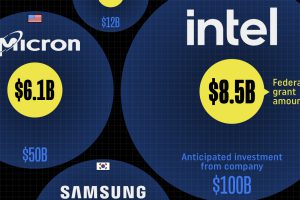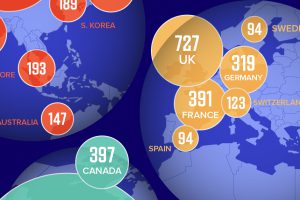How Long it Took for Popular Apps to Reach 100 Million Users
Of Twitter’s many new rivals, Meta’s newest social media platform Threads has established its presence with a bang.
According to Meta founder Mark Zuckerberg, Threads took only 5 days to reach the key threshold of 100 million users. It achieved this milestone through organic demand—and no paid promotions required—smashing all previous records.
But how long have other popular platforms—TikTok, Instagram, and YouTube to name a few—taken to build their user base? Pulling data from PwC and Yahoo, we rank how long it took popular platforms to get to 100 million users.
window.onload = function() {
if (window.location.href.includes(“/sp/”)) {
var vcSpNewsletter = document.querySelector(“a.vc-newsletter”);
vcSpNewsletter.style.display = “none”;
} else {
var voronoiAd = document.querySelector(“.voronoi-in-content.visua-target”);
var voronoiAd2 = document.querySelector(“.visua-post-bottom.visua-target”);
voronoiAd2.style.display = “none”;
voronoiAd.style.display = “none”;
}
};
Ranking Every Apps Journey to 100 Million Users
In first place, Threads has a significant lead over the rest of the pack with its five day achievement, and may have built a significant moat in holding on to this record.
Firstly, its launch coincided with Twitter’s viewing limit decision, and rode the wave of dissatisfaction aimed at Twitter’s current owner, Elon Musk.
Secondly, new users on Threads need an Instagram account to register, thus eliminating sign-up barriers and leveraging Instagram’s 1.2 billion-strong user base.
Here’s the journey length of popular platforms to attaining 100 million users:
| Rank | Platform | Launch | Time to 100M Users |
|---|---|---|---|
| 1 | Threads | 2023 | 5 days |
| 2 | ChatGPT | 2022 | 2 months |
| 3 | TikTok | 2017 | 9 months |
| 4 | 2011 | 1 year, 2 months | |
| 5 | 2010 | 2 years, 6 months | |
| 6 | Myspace | 2003 | 3 years |
| 7 | 2009 | 3 years, 6 months | |
| 8 | Snapchat | 2011 | 3 years, 8 months |
| 9 | YouTube | 2005 | 4 years, 1 month |
| 10 | 2004 | 4 years, 6 months | |
| 11 | Spotify | 2006 | 4 years, 7 months |
| 12 | Telegram | 2013 | 5 years, 1 month |
| 13 | 2006 | 5 years, 5 months | |
| 14 | Uber | 2011 | 5 years, 10 months |
| 15 | 2010 | 5 years, 11 months | |
| 16 | Google Translate | 2006 | 6 years, 6 months |
| 17 | World Wide Web | 1991 | 7 years |
| 18 | 2003 | 7 years, 11 months |
Ranked second, Open AI’s ChatGPT launched in November 2022 and hit 100 million users by the start of the new year. ChatGPT introduced the incredible capabilities of large language models to the masses, prompting a rush of sign-ups, and reviving old conversations around the potential consequences of AI.
Coming in at third place, ByteDance’s TikTok took just 9 months to reach 100 million users after its launch in 2017. Like Threads, TikTok benefited from another app, accessing popular lip syncing app Musical.ly’s existing user base after it was acquired and folded into TikTok.
WeChat and Instagram round out the top-five, also with interesting advantages. WeChat, an instant messaging platform similar to WhatsApp, benefited from its unique access to China’s notoriously closed internet market of 500 million users in 2012.
Meanwhile, Meta acquired Instagram when the photo-sharing platform had 30 million users, and more than tripled that number past 100 million in just one year.
And while Facebook ranks solidly middle-of-the-pack for fastest to 100 million users, it remains the platform with the most monthly active accounts, at nearly 3 billion. In fact, Meta’s lessons learned from Facebook have been well-leveraged, and the company owns 4 of the fastest apps to register 100 million users.
window.onload = function() {
if (window.location.href.includes(“/sp/”)) {
var vcSpNewsletter = document.querySelector(“a.vc-newsletter”);
vcSpNewsletter.style.display = “none”;
} else {
var voronoiAd = document.querySelector(“.voronoi-in-content.visua-target”);
var voronoiAd2 = document.querySelector(“.visua-post-bottom.visua-target”);
voronoiAd2.style.display = “none”;
voronoiAd.style.display = “none”;
}
};
So What Does Threads Success Mean for Twitter?
Coming back to Threads’ incredible feat, however, it’s still early days whether an en-masse switch from Twitter is on the cards for Meta’s newest platform.
For one, Threads has faced significant criticism due to its intensive data collection practices and lack of accessibility features. It also is missing some key features from its rival, including trending topics, hashtags, and direct messages.
Meanwhile Elon Musk has been less than pleased with Threads’ success, deeming it a copy of Twitter and even threatening legal action.
Competition is fine, cheating is not
— Elon Musk (@elonmusk) July 6, 2023
So where does this leave the increasingly-crowded social media space? The next decade will set the stage for either more platform consolidation, or even further audience fragmentation.
window.onload = function() {
if (window.location.href.includes(“/sp/”)) {
var vcSpNewsletter = document.querySelector(“a.vc-newsletter”);
vcSpNewsletter.style.display = “none”;
} else {
var voronoiAd = document.querySelector(“.voronoi-in-content.visua-target”);
var voronoiAd2 = document.querySelector(“.visua-post-bottom.visua-target”);
voronoiAd2.style.display = “none”;
voronoiAd.style.display = “none”;
}
};






